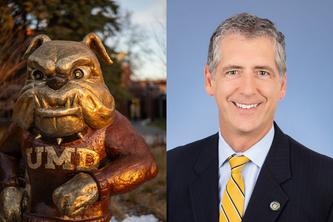
The University of Minnesota and the American Association for the Advancement of Science (AAAS) are excited to announce that two U of M researchers have been named 2019 AAAS Fellows.
John A. Downing, professor at the University of Minnesota Duluth and director of Minnesota Sea Grant, and Craig Packer, professor at the University of Minnesota Twin Cities and director of the Lion Research Center, are among the 443 members honored this year by AAAS because of their efforts to advance science and its applications.
John A. Downing, Ph.D., Swenson College of Science and Engineering
Downing was elected in the atmospheric and hydrospheric sciences category for distinguished contributions to the fields of limnology, biogeochemistry and climate change science, particularly for understanding and mitigating the role of eutrophication in the biosphere.
“My current research interests include measuring how local water quality degradation can have global consequences,” Downing said. “There is nothing so basic to life as healthful water supplies. We need to help people around the world find ways to make their water supply systems resilient to severe weather and drought.”
In addition to leading the University of Minnesota Sea Grant program, Downing is also a research scientist at the University of Minnesota Duluth Large Lakes Observatory and a tenured professor in the UMD Department of Biology. His research pursuits include limnology, marine science, environmental economics and terrestrial ecology.
“John helps society preserve good water,” Large Lakes Observatory Director Bob Sterner said. “He brings together science and society by excelling in basic science and working extensively on the application of science to solving societal programs in freshwater and marine coastal environments.”
Craig Packer, Ph.D., College of Biological Sciences
Packer is being recognized for his pioneering studies of African lions, which have shaped much of what is known about these iconic creatures.
Packer established the world’s first research center dedicated to the study of lions in 1986 and has led numerous research projects over the years including one of the largest, online, citizen-science projects in the world. Called Snapshot Serengeti, the vast network of camera traps has generated millions of images classified by people all over the world. The project became Snapshot Safari in 2018, expanding to 28 different wildlife areas in Africa and providing valuable data for ecologists and wildlife managers.
Packer has researched numerous aspects of lion behavior, among the most memorable being a study focused on the importance of a male lion’s mane. His team documented how the mane increases the risk of overheating and serves as an ornament to impress females. Males can only grow black manes if they are in excellent physical condition. Black-maned males are more aggressive and are more successful at ensuring the survival of their offspring. He and his students have also identified the factors that have caused lions to become man-eaters in certain parts of Africa and worked with scientists in Asia and Australia to develop statistical models to better predict the location of future attacks by man-eating lions, leopards and tigers.
Packer’s current work focuses on larger-scale issues tied to conservation and ecological sustainability in Africa and across the globe.
“With the anticipated human population growth in Africa over the rest of this century, I’m working to better understand how to mitigate conflicts between people and dangerous wildlife species like lions,” Packer said. “This ranges from identifying the highest-priority areas for building perimeter fences to separate people from lions and elephants to encouraging the adoption of efficient agricultural practices aimed at producing more food from less land.”
Packer and Downing will be recognized for their contributions during the Fellows Forum in February 2020.
About the University of Minnesota
The University of Minnesota System, with campuses in Crookston, Duluth, Morris, Rochester, and the Twin Cities, is driven by a singular vision of excellence. We are proud of our land-grant mission of world-class education, groundbreaking research, and community-engaged outreach, and we are unified in our drive to serve Minnesota. Visit system.umn.edu.
American Association for the Advancement of Science
The American Association for the Advancement of Science (AAAS) is the world’s largest general scientific society and publisher of the journal Science (www.sciencemag.org) as well as Science Translational Medicine, Science Signaling, a digital, open-access journal, Science Advances, Science Immunology, and Science Robotics. AAAS was founded in 1848 and includes nearly 250 affiliated societies and academies of science, serving 10 million individuals. Science has the largest paid circulation of any peer-reviewed general science journal in the world. The non-profit AAAS (www.aaas.org) is open to all and fulfills its mission to “advance science and serve society” through initiatives in science policy, international programs, science education, public engagement, and more. For the latest research news, log onto EurekAlert! (www.eurekalert.org), the premier science-news website, a service of AAAS. See www.aaas.org.
- Categories:
- Campus Affairs





